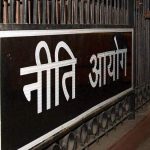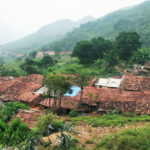The pandemic has entered the rural areas, particularly the tribal pockets where primary health centres lack adequate man-power such as doctors, paramedics and infrastructure among other things which need immediate attention.
When the police patrol van parks at Rasulgarh square in Bhubaneswar with its rotating beacon lights and sirens screaming around 10.45 a.m, it’s alarm for shopkeepers and vegetable vendors alike to hurry up home and down their shutters. The cops are but diligent agents executing the errands of the bureaucratic decisions in a democratic dispensation. Thanks to the pandemic measures, issued by the Centre to states, governing handling of third wave of Covid-19, Odisha has enthusiastically extended the lockdown restrictions up to June 17 to the chagrin of working class, business community and entrepreneurs while the state’s economy has been on a downslide. Several hundred daily wage earners including cab and autorickshaw drivers, petty traders and vegetable vendors who were looking forward to unlock days see no other means of boosting their family resources but to suffer pangs of poverty. Many of them are employed partially or sharing pension of the old and sick beneficiaries in their family. While the pandemic spread of Coronavirus across the country has started shrinking, Odisha’s precautionary measures including curtailing of shopping hours appear to be taken in haste. Even as Odisha’s test positive cases remain around 20 per cent, the authorities have claimed the situation as within ‘control’. According to available statistics, the country has witnessed a sharp decline in daily Covid-19 cases in the past ten days. While the weekly positivity rate has dwindled to five per cent in 344 districts across the 718 districts in the country, the active caseload has also shown a drastic comedown. Covid deaths due to Corona complications have dropped below 3,000 during the fourth week of May and this suggests that the second wave has started waning. Now, the crucial question is: Is it the right time for unlocking? We know Delhi, Uttar Pradesh, Madhya Pradesh and Jammu and Kashmir governments have started gradual unlocking process while Odisha has begun extending its lockdown norms while reducing the shopping hours. “The decision is the result of upper class thinking that runs parallel to the common people’s lot. The decision-makers are unmindful of the impact of the restrictions will have on the poor. I earn between Rs 300 and Rs 450 per day which takes care of the auto-carriage, diesel and family expenses,” says Manoj Barik, an auto-rickshaw operator, who has an eight-member family residing in Tankapani area in Bhubaneswar. The Delhi Government, for instance, has extended night curfew on movement of people in the city until June 7 and allowed all industrial and construction activities to the benefit of working class people. Haryana has also relaxed shopping and mall timings and the state’s lockdown norms will be in force only for a week. Uttar Pradesh has lifted curfew curbs in 64 districts and Odisha in three out of 30 districts. However, Gujarat, Bengal, Maharashtra, Bihar, Kerala, Tamil Nadu, Andhra, Telangana, Rajasthan, Punjab, and Goa have extended lockdown restrictions on Odisha’s known lines. In view of the approaching third wave of the pandemic, the Centre’s Covid task force members have suggested gradual lifting of restrictions to normalise life and hoped such curbs will not escalate cases on a large scale. “Provisions stores used to be kept open from 6 a.m to 12 p.m till recently. Now, we’ve been instructed to down shutters by 10.45 a.m. We are not able to meet rush of buyers jostling with each other for provisions between 7 a.m. and 11 a.m as the authorities have curtailed shopping hours facilitating spread of pandemic,” states Om Shivaram Patra, a kirana shopkeeper. The reality in Odisha today is scary as the pandemic has entered the rural areas, particularly the tribal pockets where primary health centres lack adequate man-power such as doctors, paramedics and infrastructure among other things which need immediate attention. The hospitals in the towns and cities, on the other hand, are under pressure of positive patients and shortage of staff and insufficient vaccines to meet demand. And interestingly, anti-Covid vaccines have not reached the PHCs for people in rural and remote tribal areas where lockdown measures are also slack or in bad shape !!








































